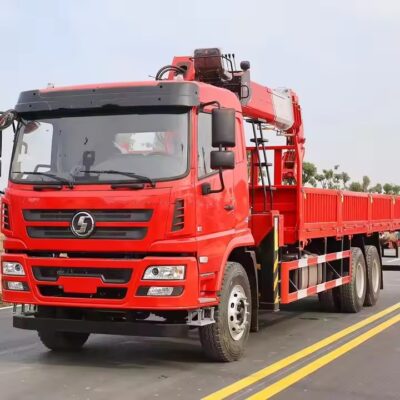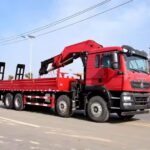When it comes to handling heavy lifting tasks in various industries, loader cranes are indispensable pieces of equipment. They are designed to load and unload heavy materials efficiently, making them a critical asset in construction, logistics, forestry, and many other sectors. With advancements in technology, modern loader cranes have become more efficient, versatile, and capable of handling even the most challenging lifting tasks. In this article, we will explore some of the top models of efficient loader cranes available today, highlighting their features, capabilities, and the benefits they offer to various industries.
The Importance of Efficient Loader Cranes
Efficient loader cranes are essential for several reasons:
1. Increased Productivity: By enabling faster loading and unloading processes, efficient loader cranes help increase overall productivity.
2. Безопасност: Modern loader cranes come equipped with advanced safety features that protect both operators and the materials being handled.
3. Универсалност: These cranes can be used in a variety of environments and applications, from urban construction sites to remote forestry operations.
4. Cost-Effectiveness: Investing in efficient loader cranes can reduce labor costs and minimize downtime, leading to significant long-term savings.

Top Models of Efficient Loader Cranes
1. Hiab X-HiPro 558
The Hiab X-HiPro 558 is a top-tier loader crane renowned for its exceptional lifting capacity and precision. This model is designed to handle heavy loads with ease, making it ideal for demanding applications.
Key Features:
– Lifting Capacity: Up to 58 ton-meters
– Reach: Up to 21 meters with jib extension
– Control System: HiPro remote control for precise operation
– Безопасност: Automatic Speed Control (ASC) и Variable Stability Limit (VSL) for enhanced safety
The Hiab X-HiPro 558‘s combination of power and precision makes it a preferred choice for tasks requiring both heavy lifting and delicate handling, such as the construction of large structures or the transportation of fragile materials.
2. Palfinger PK 150002
The Palfinger PK 150002 is another leading model in the heavy lifting category, known for its robust construction and versatile capabilities. This crane is engineered to deliver high performance in various challenging environments.
Key Features:
– Lifting Capacity: Up to 150 ton-meters
– Reach: Up to 35 meters with fly jib
– Control System: PALTRONIC 150 control system for enhanced operator convenience
– Безопасност: HPSC (High-Performance Stability Control) for optimal stability
The Palfinger PK 150002 excels in situations where both maximum reach and lifting power are required, such as in the installation of wind turbines or the assembly of large industrial equipment.
3. Fassi F1100RA
Fassi’s F1100RA loader crane stands out due to its innovative design and advanced technology. This model is particularly well-suited for heavy lifting tasks that demand both strength and flexibility.
Key Features:
– Lifting Capacity: Up to 110 ton-meters
– Reach: Up to 30 meters with jib
– Control System: FX900 control system for seamless operation
– Безопасност: Prolink system for precise movements and stability control
The Fassi F1100RA is a versatile crane that can handle a wide range of heavy lifting tasks, from urban construction projects to remote oil and gas operations, thanks to its adaptability and advanced control features.
4. Effer 2055
The Effer 2055 is designed for extreme heavy lifting, offering unmatched power and reach. This loader crane is built to handle the most challenging lifting tasks with ease.
Key Features:
– Lifting Capacity: Up to 205 ton-meters
– Reach: Up to 41 meters with jib
– Control System: Progress 2.0 electronic control system
– Безопасност: Advanced stability system for maximum safety
With its extraordinary lifting capacity and extensive reach, на Effer 2055 is ideal for large-scale construction projects, heavy machinery transport, and other demanding applications.
5. Cargotec Kalmar DCG
The Cargotec Kalmar DCG is a versatile loader crane that combines efficiency with reliability. It is particularly well-suited for port operations and heavy-duty industrial applications.
Key Features:
– Lifting Capacity: Up to 150 ton-meters
– Reach: Variable, depending on configuration
– Control System: SmartFleet monitoring system for optimal performance tracking
– Безопасност: Enhanced safety features including load sensing and automatic braking
The Kalmar DCG‘s robust design and advanced monitoring capabilities make it a reliable choice for industries where efficiency and uptime are critical, such as shipping and logistics.
Benefits of Modern Loader Cranes
Modern loader cranes offer numerous benefits that enhance their efficiency and utility:
1. Advanced Control Systems: Modern cranes are equipped with sophisticated control systems that allow for precise movements and adjustments, improving safety and efficiency.
2. Enhanced Stability: Innovative stability control systems ensure that cranes can handle heavy loads without compromising safety, even in challenging conditions.
3. Fuel Efficiency: Newer models are designed to be more fuel-efficient, reducing operational costs and environmental impact.
4. Remote Operation: Many loader cranes now offer remote operation capabilities, allowing operators to control the crane from a safe distance.
5. Универсалност: With various attachments and configurations, modern loader cranes can be adapted to a wide range of tasks, enhancing their versatility.

Заключение
Ефективен loader cranes are essential tools in many industries, providing the power, precision, and safety needed to handle heavy lifting tasks. The top models discussed—Hiab X-HiPro 558, Palfinger PK 150002, Fassi F1100RA, Effer 2055, и Cargotec Kalmar DCG—represent the pinnacle of modern crane technology. These cranes offer exceptional lifting capacities, advanced control systems, and robust safety features, making them invaluable assets in construction, logistics, forestry, and beyond. By investing in these efficient loader cranes, businesses can enhance their productivity, ensure safety, and achieve greater operational efficiency.









